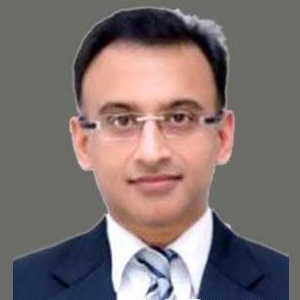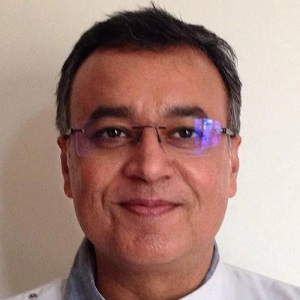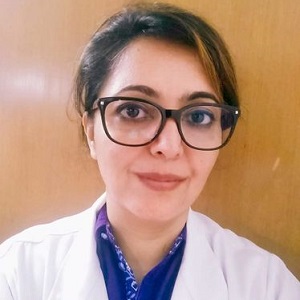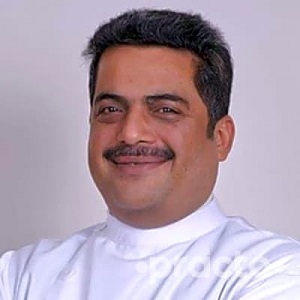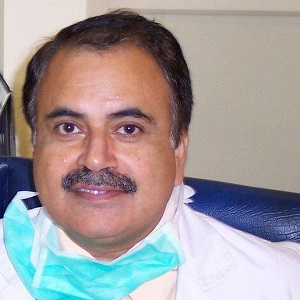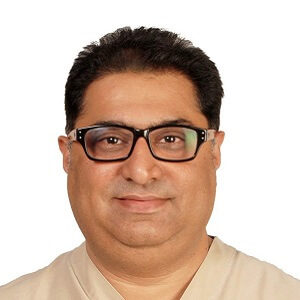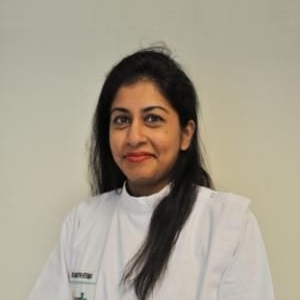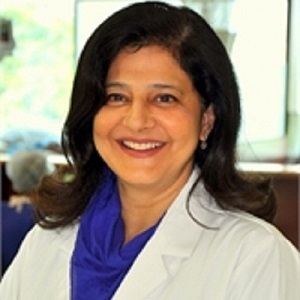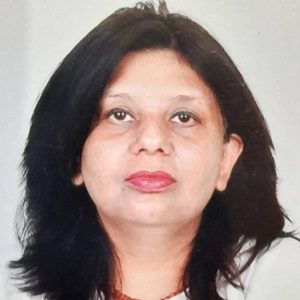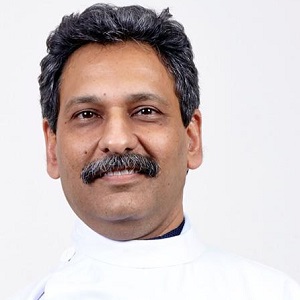Best Doctors in India for Dental Bridge
- Dentist and Dental Surgeon, New Delhi, India
- Over 21 years’ experience
Profile Highlights:
- Dr. Adosh Lall is one of the best dentists in India. He is having an experience of over 21 years.
- He has been involved in imparting education to graduate and postgraduate students for 14 years. Also, he is an examiner of postgraduate students in India and Nepal.
- Dr. Adosh Lall has treated innumerable patients successfully in his past years as a dentist.
- Dentist, New Delhi, India
- Over 24 years’ experience
Profile Highlights:
- Dr. Jatin Ahuja is one of the most successful Orthodontists who has 24 years of experience in this field.
- He has performed numerous operations related to oral cavities in India and abroad.
- He has been treating several diseases related to oral health.
- Dentist, New Delhi, India
- Over 27 years’ experience
Profile Highlights:
- Dr. Smriti Bouri is a leading female Dental consultant who has been serving people for the last 27 years.
- She has performed a wide array of procedures all related to dental care.
- She served in the Indian Army during the early years of her career as a dentist.
- Dentist, Gurugram, India
- Over 20 years’ experience
Profile Highlights:
- Dr. Ravi S Batra is one of the most popular faces in the Department of Dentistry.
- He has 16 years of experience in treating patients who belong to different age groups.
- Dr. Batra has expert hands in diagnosing and treating orthodontic problems which mostly need surgical rectification.
- Dentist and Dental Surgeon, New Delhi, India
- Over 35 years’ experience
Profile Highlights:
- Dr. Neeraj Verma is one of those prominent dentists in India who is having more than 35 years of experience.
- He is the vice president of the Indian Dental Association in Delhi.
- Due to his sound experience in Dentistry, Dr. Neeraj Verma received the Vishisht Seva Medal by the President of India.
- Dentist and Dental Surgeon, New Delhi, India
- Over 32 years’ experience
Profile Highlights:
- Dr. Ashish Kakkar is a Dentist at Indraprastha Apollo Hospitals, New Delhi providing the best Dental care in India. He has an experience of more than 32 years.
- Dr. Kakkar is a dental surgeon providing advanced dental care to patients. Patients can reach out to him for specialized services like dental checkups, teeth reshaping or remodeling, prosthodontic treatment or Cosmetic/Aesthetic dentistry, RCT, Pulpectomy, treatment of gum ailments, sinus augmentation, and identification & treatment of tooth decay.
- Dentist, New Delhi, India
- Over 10 years’ experience
Profile Highlights:
- Dr. Aishwarya Verma is one of the leading Dental Consultants in India.
- She has been an excellent student throughout her academic life. She has completed BDS and MDS with flying colors.
- She has treated patients both within India and abroad and is widely known for her success.
- Dr. Aishwarya has diagnosed several cases related to oral health and treated them with her knowledge and experience.
- Dentist, Gurugram, India
- Over 20 years’ experience
Profile Highlights:
- Dr. Anjana Satyajit is a dedicated dentist with an experience of more than two decades.
- She is an expert in Endodontics and has been treating numerous patients all over the country.
- Dr. Satyajit has received her Graduation in Dentistry from Maulana Azad Medical College in Delhi.
- Dentist, Gurugram, India
- Over 20 years’ experience
Profile Highlights:
- Dr. Payal Nayar has been practicing dentistry for the pediatrics department for the last 20 years.
- She has expert hands in oral rehabilitation, pediatric root canals, orthodontic treatment, rampant caries, etc.
- She received Certification in the field of Prosthetic Dentistry from Smile India.
- Dentist, Gurugram, India
- Over 20 years’ experience
Profile Highlights:
- Dr. Vineet Ohri is one of those prominent dentists in India who has received special training in Endodontics.
- He has 20 years of experience in treating patients.
- Dr. Ohri worked in prominent hospitals like Indraprastha Apollo and Fortis Hospital, Vasant Kunj.
Best Hospitals in India for Dental Bridge
Indraprastha Apollo Hospital, New Delhi
- City: New Delhi, India
Hospital Highlights:
- Indraprastha Apollo Hospital is a 700-bedded multispecialty hospital in the heart of the capital of India. It is a part of Apollo Hospital group, one of India’s most reputed healthcare chains. Indraprastha Apollo Hospital has been accredited by Joint Commission International, making it the first internationally accredited hospital in the country in 2005.
- There are 52 specialties in the hospital with one of the best cardiology centers in the country. The hospital is also equipped with State of the art infrastructure facilities with the largest Sleep Lab in Asia and the largest number of ICU bed facilities in India.
- The hospital also has one of the largest dialysis units in India along with a dedicated Bone Marrow Transplant unit.
- The latest and highly advanced technologies that are installed in the hospital include Da Vinci Robotic Surgery System, PET-MR, PET-CT, Cobalt-based HDR Brachytherapy, Brain Lab Navigation System, Tilting MRI, Portable CT scanner, 3 Tesla MRI, 128 Slice CT scanner, DSA Lab, Endosonography, Hyperbaric Chamber and Fibro scan.
Fortis Memorial Research Institute, Gurugram
- City: Gurugram, India
Hospital Highlights:
- Fortis Memorial Research Institute is a multi-super-specialty, quaternary care hospital with 1000 beds. The hospital comprises reputed clinicians, and international faculty and is also equipped with cutting-edge technology. The hospital is a part of Fortis Healthcare Limited, a reputed chain of private hospitals in India.
- It is a NABH-accredited hospital that is spread across 11 acres of land and has a capacity of 1000 beds. The hospital has 55 specialties and is one of the premier health care centers in the Asia Pacific region popularly known as “the Mecca of Healthcare”.
- The hospital has 260 diagnostic centers and is also equipped with the latest and advanced techniques that include 3 Telsa which is the world’s first Digital MRI technology. The hospital also has world-class Radiation Therapy techniques which have been developed by leading technology experts from Elekta and Brain Lab.
Apollo Hospital, Chennai
- City: Chennai, India
Hospital Highlights:
- Apollo Hospitals, Chennai, is one of the best hospitals for heart care in India. Over the years, Apollo has expanded all over India, as a healthcare chain.
- India’s first ‘Only Pancreas’ transplant was performed in Apollo Hospital. The hospital is known for successfully performing Asia’s first en-bloc combined heart and liver transplant, and over the years, it has attained a remarkable achievement in the global healthcare space. Around 3-4 organ transplants are performed in the hospital per day.
- Equipped with over 500 beds, this hospital in Chennai was established in 1983 and since then has been among the most preferred hospital for patients from all over the world.
- The hospital holds accreditation of the NABH and JCI and is the first hospital in India to be ISO 9001 and ISO 14001 certified. It is also the first South Indian Hospital to receive subsequent reaccreditation from the JCI USA 4 times.
Medanta-The Medicity, Gurgaon
- City: Gurugram, India
Hospital Highlights:
- One of India’s best and largest multi-specialty hospitals, Medanta was built with the aim to bring India to the highest standards of medical care. The hospital has been providing the best medical services to its patients, since its inception, with care, commitment, and compassion.
- Equipped with 1250 beds, the hospital was founded by Dr. Naresh Trehan in the year 2009 with an aim to provide the best medical care at affordable costs. The hospital is spread across 43 acres and includes 45 operation theatres and 350 beds dedicated solely to ICU. The hospital includes over 800 doctors, and more than 22 specialty departments and has a dedicated floor for individual specialty in order to offer the best services under one roof.
- The hospital is considered one of the premier institutes in India for Cardiac Care and includes staffs and members of high caliber. The hospital has 6 distinct centers of excellence.
Max Super Specialty Hospital, New Delhi
- City: New Delhi, India
Hospital Highlights:
- One of the well-regarded providers in India committed to the highest standards of clinical excellence and patient care, Max Super Specialty Hospital is a part of Max Healthcare, which is the second-largest healthcare chain in India. Regarded as one of the most well-regarded healthcare providers in the country, Max Super Specialty Hospital is committed to the highest standards of clinical excellence as well as patient care. The hospital is also equipped with the latest technology as well as cutting-edge research. The hospital is known to deliver and ensure the highest level of patient care.
- The hospital has more than 500 beds and offers treatment for over 35 specialties. The hospital also holds the credit of having installed the first Brain Suite in Asia. This is a highly advanced Neurosurgical machine that allows MRI to be taken while surgery is ongoing.
- Other advanced and latest technologies are also installed in the hospital such as the 1.5 Tesla MRI machine, 64 Slice CT Angiography, 4D ECHO, LINAC, and 3.5T MRI machine.
Artemis Hospital, Gurugram
- City: Gurugram, India
Hospital Highlights:
- One of the most well-known hospitals in the Delhi NCR, Artemis Hospital is the first hospital in Gurugram to get accredited by the Joint Commission International.
- With more than 40 specialties, the hospital has been designed to be one of the most technically advanced hospitals in the country, with the best medical and surgical health care. The hospital has eleven special and dedicated centers, for Heart, Cancer, Neurosciences, etc.
- The latest technologies in the hospital include Endovascular Hybrid Operating Suite and Flat panel Cath Labs for the cardiovascular department, 3 Tesla MRI, 16 slice PET CT, 64 Slice Cardiac CT Scan, HDR Brachytherapy, and highly advanced Image Guided Radiation Therapy techniques (LINAC) are installed in the hospital.
- The hospital has won several awards as well, since its inception.
BLK Max Super Specialty Hospital, New Delhi
- City: New Delhi, India
Hospital Highlights:
- Equipped with 650 beds, BLK Superspecialty Hospital is the largest stand-alone private sector hospital in Delhi.
- With over 1500 healthcare providers and 150 globally renowned super specialists, the hospital is one of Asia’s largest Bone Marrow Transplant Centres. The hospital is known for having some of the best cancer doctors in the country.
- The hospital is NABH and NABL accredited and was inaugurated by the first Prime Minister of India. Pt. Jawahar Lal Nehru.
Gleneagles Global Hospitals, Chennai
- City: Chennai, India
Hospital Highlights:
- Established in 1999, Gleneagles Global Hospital, Chennai, is one of the top healthcare facilities in Southern India. It is part of the Gleneagles Hospital Chain, which is the fourth largest healthcare chain in the country. The hospital specializes in multi-organ transplants of kidneys, liver, lungs, heart, etc.
- The hospital has an excellent infrastructure and state-of-the-art lab and equipment set-up. The hospital boasts cutting-edge technologies, a highly skilled team of doctors and surgeons, and trained support staff. Located in Perumbakam, Chennai, it is one of India’s premier health care destinations. The hospital has performed some of the most complex surgical and clinical procedures in India including multi-organ transplantations.
- The hospital’s lung transplantation program is one of the best in the country. The hospital is known for having performed India’s first single lung transplant and first minimal invasive lung transplant. It is also the only Indian hospital to be associated with King’s College Hospital, London, United Kingdom for liver transplantations.
Fortis Hospital, Mulund, Mumbai
- City: Mumbai, India
Hospital Highlights:
- Fortis Hospital in Mulund is a 315-bed multi-speciality tertiary care hospital with five JCI accreditations that offers a wide variety of diagnostic and therapeutic services. The Fortis Hospital in Mulund delivers patient-centred treatment with cutting-edge technology, highly skilled and experienced surgeons, and paramedical staff.
- This institution houses Maharashtra’s largest multi-organ transplant centre. It is also the first heart transplant centre in western India to conduct 100 or more consecutive heart transplants in under four years. It is the only hospital in the city to have multi-organ transplants and has handled the youngest patient for angioplasty. Fortis Hospital Mulund now boasts the first advanced surgical robot in central Mumbai.
- Cardiology and heart surgery, urology, nephrology, neurosciences, orthopaedics, digestive care, emergency and critical care, and maternity care are among the services provided by the hospital.
Kokilaben Dhirubhai Ambani Hospital, Mumbai
- City: Mumbai, India
Hospital Highlights:
- Kokilaben Dhirubhai Ambani Hospital, Named after the wife of Indian industrialist Dhirubhai Ambani, the founder of Reliance Industries, this is one of the top hospitals in Mumbai. This 750-bed multi-specialty hospital became operational in 2009. Known as one of India’s most advanced tertiary care facilities, the hospital is designed to raise India’s global standing as a healthcare hub, with an emphasis on excellence in clinical services.
- Kokilaben Dhirubhai Ambani Hospital uses Protocol and Care Pathway based treatment models to ensure the best outcomes for patients.
- The hospital represents a confluence of top-notch talent, cutting-edge technology, state-of-the-art infrastructure, and, most importantly commitment.
- The hospital also holds the accreditation of the NABH, NABL, CAP, and JCI.
- The hospital has been recognized as the No. 1 Multispecialty Hospital in Mumbai and the West Zone for the fifth year in a row in 2020 by The Week.
DENTAL BRIDGE
The dental bridge procedure is a type of restorative dental treatment for replacing any missing teeth. If you are having any teeth missing, your dentist can close or bridge the gaps in your smile with the help of dental bridges.
Basically, it is a kind of false tooth that is held in place by the abutment teeth on either side of the gap. They are generally made from porcelain to blend in with your natural teeth aesthetically, though in some cases, they can be made with a variety of materials such as gold.
Purpose
If you are having a tooth or teeth missing, it can affect you in various ways. A dental bridge can help you with several changes, which includes:
- restoring your smile
- restoring your speech and pronunciation
- restoring your ability to chew properly
- helping you maintain the shape of your face
- Preventing any of your remaining teeth from moving out of the correct position
- re-adjusting your bite to properly distribute the force whiling chewing
Preparation & procedure
The first step in the dental bridge procedure is to assess the need for restorative dental treatment for replacing any missing teeth, and whether a dental bridge is a correct option. Sometimes, there are other restorative dental treatments that might be more appropriate, such as dental crowns and dental implants.
The dentist is going to examine the area and then take X-rays of the jaw for gaining a full understanding of the situation, and for making the best decision.
It is important for the dentist to discuss the best possible options with the patients.
Once the decision for a dental bridge has been finalized, the first dental appointment is going to involve preparing the abutment teeth for the crowns that will be holding the bridge in place.
The abutment teeth are prepared by removal of some of the enamel i.e. the outside layer of the teeth, in order to prepare room for the crown to be placed over them.
Next, an impression of the teeth is going to be taken using a soft material that the patient is going to bite into. This will leave an indentation of the teeth’s exact outline. After this is done, a plaster-like material is poured into the impressions to make a model of the teeth, in which the bridge is going to be made in the dental lab.
This indented model is used in the dental lab for making the permanent bridge. A temporary bridge is placed over the abutment teeth for protecting them until the permanent crown is constructed by the dental lab.
During your second visit to your dentist, the temporary crowns are removed, after which the permanent crowns are checked for proper fitting. Then they are fitted using a strong and permanent type of cement. Next, your dentist checks the crown to ensure that the patient’s bite is not very high and it is able to adjust accordingly. Next, the dentist may use temporary cement for affixing the permanent bridge, to allow some time to ensure a proper fit, before he/she cements the new bridge in place permanently.
Recovery and aftercare
Generally, dental bridges can last around five to seven years. With good oral hygiene and regular professional cleanings, it might even last over 10 years.
The success of the dental bridge also depends on the health as well as the strength of the remaining teeth. With a bridge, it is important to prevent tooth decay and gum disease that can lead to tooth loss. For proper tooth and gum care, you need to brush twice a day, at least, and floss daily.
See a dentist regularly so that he/she can help you detect problems early if there are any. It is also important for you to eat a balanced diet.
Risks
If you take proper care of your dental bridge, it can generally last several years without causing any complications. However, it may fail, if the cement deteriorates or if the surrounding teeth decay. But if the supporting teeth are still healthy and intact, then your provider can reattach the bridge using new cement, if it comes loose.

